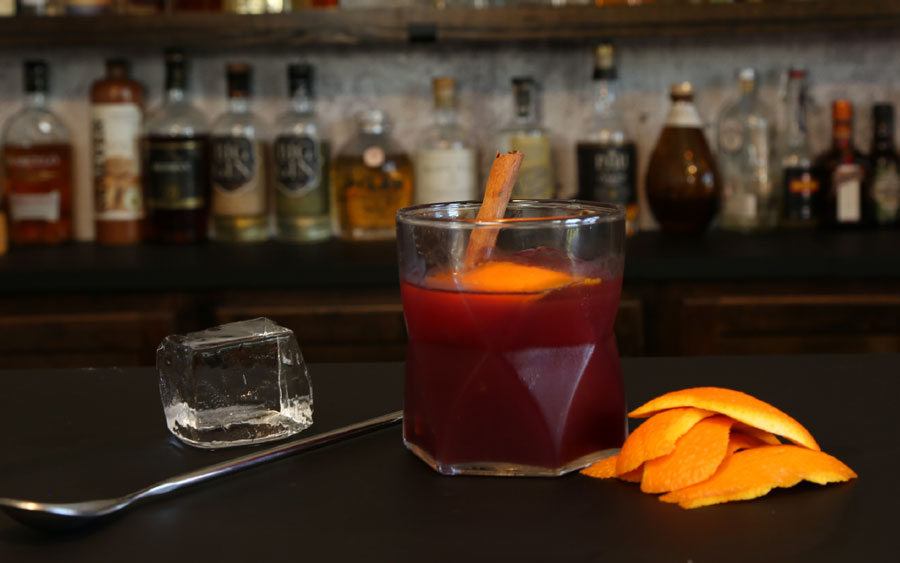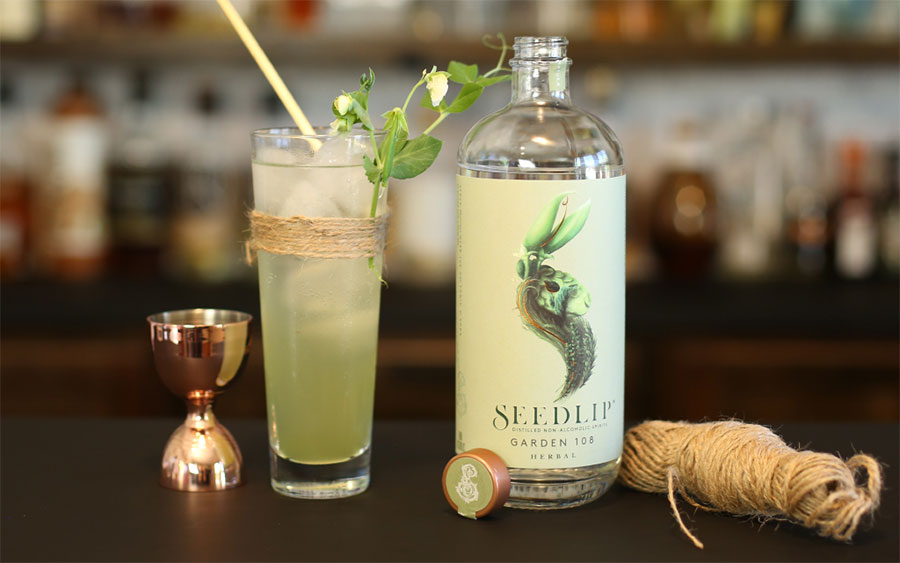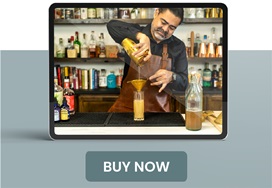
If you had to craft up a mocktail right now, what would you make? Let me take a wild guess; it’s either a Shirley Temple, Virgin Strawberry Daiquiri or some kind of fancy lemonade.
Instead of creating yet another non-alcoholic sugar-bomb (which is usually more appealing to kids, anyway), why not encompass the experience of a “craft” cocktail in its non-alcoholic form? Just because the cocktail no longer contains a spirit doesn’t mean it can’t be crafted with your bar expertise!
If you struggle with creating new virgin recipes, then you’re in for a real treat! Let’s dive into the world of mocktails and explore some techniques to level up your non-alcoholic cocktails.
But first…
What Is a Mocktail?
Let’s start with the basics. Simply put, a mocktail is a cocktail without alcohol. It goes by many other names, like “non-alcoholic cocktail”, “non-alcoholic mixed drink”, “spirit free” drink, or simply calling a drink “virgin.”
All of these names work interchangeably. So, don’t get thrown off by the title— they are all the same: a mixed drink made without any alcohol.
Non-Alcoholic Cocktail Recipes
Just like cocktails, there are so many different ways to make a mocktail. Instead of drawing inspiration from the spirit, mocktails are all about creating a flavor profile from a combination of different techniques. This requires you to get creative as you can’t lean on the spirit to be the base of your recipe.
The techniques and recipes below will help you navigate the world of higher end, “craft” non-alcoholic cocktails. I think you’ll agree – there’s far more to mocktails than a sugary Shirley Temple!
Crafting Mocktail Techniques
Infusions
Infusions are an incredibly simple and effective way to add dimension to your mocktail’s flavor profile. While “infusion” may sound complex, it’s actually extremely common and easy. You most likely infuse everyday by making coffee or tea!
The two most common infusions are infused syrups and infused spirits. Considering we’re making mocktails, you wouldn’t want to create infused spirits, but you could replace an infused spirit with an infused base, like Chris’ very own “sun tea,” (aka peach tea and honey!). creating a craft mocktail is all about getting creative and experimenting with different flavor profiles.
Start your mocktail exploration by testing your infusion technique with Chris’ original Full Embrace mocktail recipe.

Oleo Saccharum
Never heard of Oleo Saccharum? Don’t get thrown off by the name. The words are latin for “Oil sugar”, and in this context it describes the process of using sugar to extract the delicious and aromatic oils from citrus. I often find that non alcoholic drinks lack aromatics, and this is a super easy way to solve that problem and add another layer of delicious flavor too.
The process of creating Oleo Saccharum is as easy as can be: simply muddle citrus peels and sugar and then put in a baggie. Remove all of the extra air and wait a few hours. Voila! Your baggie will be filed with a delicious citrusy syrup that’s just begging to hop into your nearest spirit free drink.
Give this technique a try by creating our non-alcoholic No Ragret’s Cocktail.

Egg Whites
If you want a creamier and weightier drink, then you should definitely consider incorporating egg whites into your non-alcoholic drink. Egg whites offer a rich and silky texture, and can also calm down intense or sour flavors.
If you’re new to the world of egg-white cocktails, then it may seem a little strange. I mean, we’ve all been warned about raw eggs since we were kids and eating spoonfuls of cookie dough, right? While we would never tell you that your mom’s advice is wrong, we will however tell you to reconsider raw egg whites in your cocktails.
There’s definitely a right and wrong way to safely use raw egg whites! Check out this explanation of safe egg white techniques. When you’re ready to test out egg whites in your mocktail, follow this Clever Club recipe created by Danny Rijnvis who is a member of our Craft Cocktail Club!

Our Craft Cocktail Club brings together all kinds of cocktail nerds, from bartending beginners to connoisseurs. Click here to join!
Unusual bases
Standard (and often boring) non-alcoholic cocktail recipes usually call for a sparkling water, soda or fruit juice base. If you want to level up your craft mocktails, then you’re going to have to think outside the juice – err – box!
While the above bases are extremely common, they are often very one-dimensional on taste. To create full-bodied non-alcoholic cocktails, play around with unusual bases and flavor combinations. A perfect example of this is Chris’ Cucumber Water Mint Fauxito recipe. The base of this cocktail was cucumber juice and gave the drink a beautiful aromatic and vegetal flavor. Adding mint just took it to the next level. Easy and absolutely delicious!

Shrubs
A “shrub” is a name for a non-alcoholic drink usually made with fruit, sugar, aromatics and vinegar. (Yeah you heard that right!) While it sounds like a weird thing to include, the vinegar base is what makes shrubs a little tangy and tart without relying on booze for assistance.
Just like a regular ol’ cocktail, impressive and delicious mocktails thrive on a dimensional taste profile. Shrubs give you another way to add some “bite” to a drink that would otherwise have alcohol do the job.
Obviously vinegar on its own won’t give your mocktail the taste you’re looking for. However, vinegar with some sugar and strawberries (as seen in our shrub recipe) will be a game-changer to your mixologist methods.
Give shrubs a try with Chris’ Garden Party cocktail recipe.

“Faux” booze
If you’re trying to recreate the non-alcoholic version of your favorite cocktail, then there are “faux” booze options to help you get there. Non-alcoholic spirits can help keep the flavor profile of the cocktails you know and love, but without the boozy effect. I’ll admit it; the flavor profiles aren’t exactly the same when comparing non-alcoholic spirits to their boozy counterparts, but it’s definitely in ball park range. Seedlip is probably the best known of these “non alcoholic” spirits, and we’ve also had Lyre’s as well.
Our Nogroni is the non-alcoholic version of a Negroni and uses Lyre’s Aperitif Rosso and Lyre’s Italian Orange to encompass its citrus taste in mocktail form. Try it out!

Avoid Dilution
Water is a mocktail’s worst enemy. The fastest way to kill your mocktail’s flavor is by adding too much water either directly or from melting ice. To avoid this problem, we have to get creative (like you’ve never heard that before!).
Instead of adding ice to your drink, keep mocktail ice cubes in your freezer. Simply create your favorite mocktail and freeze it in an ice tray. When your ice cubes melt, they’ll add more flavor instead of losing it to dilution!
Another approach is to chill your NA ingredients in the fridge in advance, then skip or shorten your shaking / stirring time dramatically. Again, this helps reduce the amount of extra water that’s added to the drink.
You can also freeze cubes of your infusion base or muddled fruit. There’s no right or wrong way as long as you’re staying away from water!
Put this technique to the test by following along with Chris’ Cantaloupe Mint Soda recipe featuring pureed cantaloupe ice cubes (yum!).

Use Non-Alcoholic Bitters
Bitters provide bold flavor and cut through sweetness like nothing else. And while I definitely recommend a bottle of Angostura Bitters behind every bar, it’s important to know that many cocktail bitters are made with alcohol as their base. So if you or your guest requires your drink to be 100% alcohol-free, then you should take great care to choose bitters made without alcohol.
If you’re OK with a tiny bit of booze in your drink, then you’re in luck! Nowadays it seems there are bitters for every taste, so don’t be shy. Experiment with everything from cucumber and celery to lavender and chocolate!
When making mocktails, don’t forget…
We believe in the experience behind every cocktail, whether alcoholic or not. And, by using these techniques, you’ll quickly realize that the art of mixology boils down to more than just using spirits!
If you only remember three things from this article, let it be these:
- watch your water,
- watch your sugar
- and (most importantly don’t be afraid to experiment!




Thank you for such a comprehensive article! I had a bit of info separated in several posts and articles.